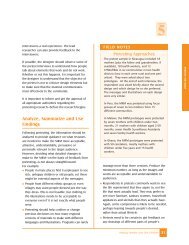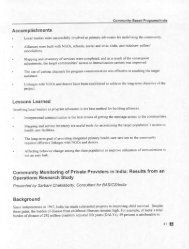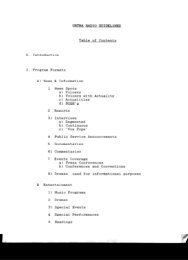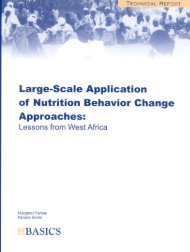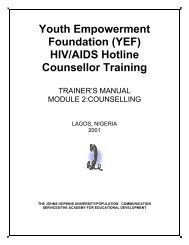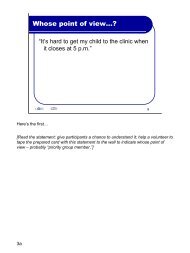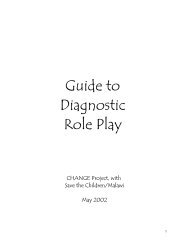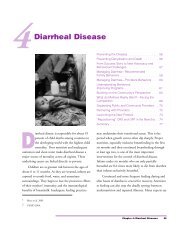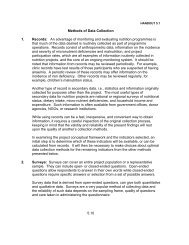MODULE TWO: COUNSELLING - FHI 360 Center for Global Health ...
MODULE TWO: COUNSELLING - FHI 360 Center for Global Health ...
MODULE TWO: COUNSELLING - FHI 360 Center for Global Health ...
You also want an ePaper? Increase the reach of your titles
YUMPU automatically turns print PDFs into web optimized ePapers that Google loves.
Feelings and Emotions of HIV-positive Women<br />
•Fear of disclosure: After receiving positive results, many women feel<br />
overwhelmed with the burden of disclosure. The decision about who to tell can<br />
be a very difficult one. A woman often learns her HIV status be<strong>for</strong>e her partner<br />
learns his. The positive test result often comes as a shock to women, especially<br />
if they have been faithful and committed to their partner. Often the male<br />
partners blame the women <strong>for</strong> HIV because they do not want to accept<br />
responsibility <strong>for</strong> it themselves. For this reason, many women fear rejection and<br />
abuse, and as a result, they choose to live in silence with the knowledge of their<br />
status. Partner abuse following disclosure of HIV is quite common, so<br />
this fear is very real and valid.<br />
Feelings of betrayal: A woman may feel betrayed by her partner, which could<br />
turn into anger. Despite this anger, she may still feel powerless to confront him.<br />
Feelings of inadequacy and helplessness: The woman may feel totally<br />
immobilized by the knowledge of her status. This may be caused by poverty,<br />
hopelessness about the lack of treatment, and the burdens of caring <strong>for</strong> her<br />
family.<br />
Fear of rejection and abandonment: Many women are rejected and/or<br />
abandoned by their partners once they disclose their status. While this is<br />
devastating <strong>for</strong> any woman, it can be especially difficult <strong>for</strong> women with children,<br />
who must now raise and support them alone.<br />
Self-blame: The woman may feel guilty about her status, especially if she has<br />
infected a child.<br />
Grief: The woman may grieve over the loss of her “old body”, including her<br />
health, body image, sexuality and child bearing potential. In addition, she may<br />
experience the loss of her partner or child to AIDS.<br />
Stress: HIV can be both physically and mentally stressful, especially if the<br />
woman cannot reveal her status to other people who might be able to support<br />
her.<br />
Differences with Men<br />
How is counselling women about HIV different from counselling men? Both of<br />
them have similar needs in terms of in<strong>for</strong>mation and referrals. There are some<br />
ways that women experience the disease differently, however, and these can<br />
create unique counselling needs:<br />
Session 8-Pg.8



